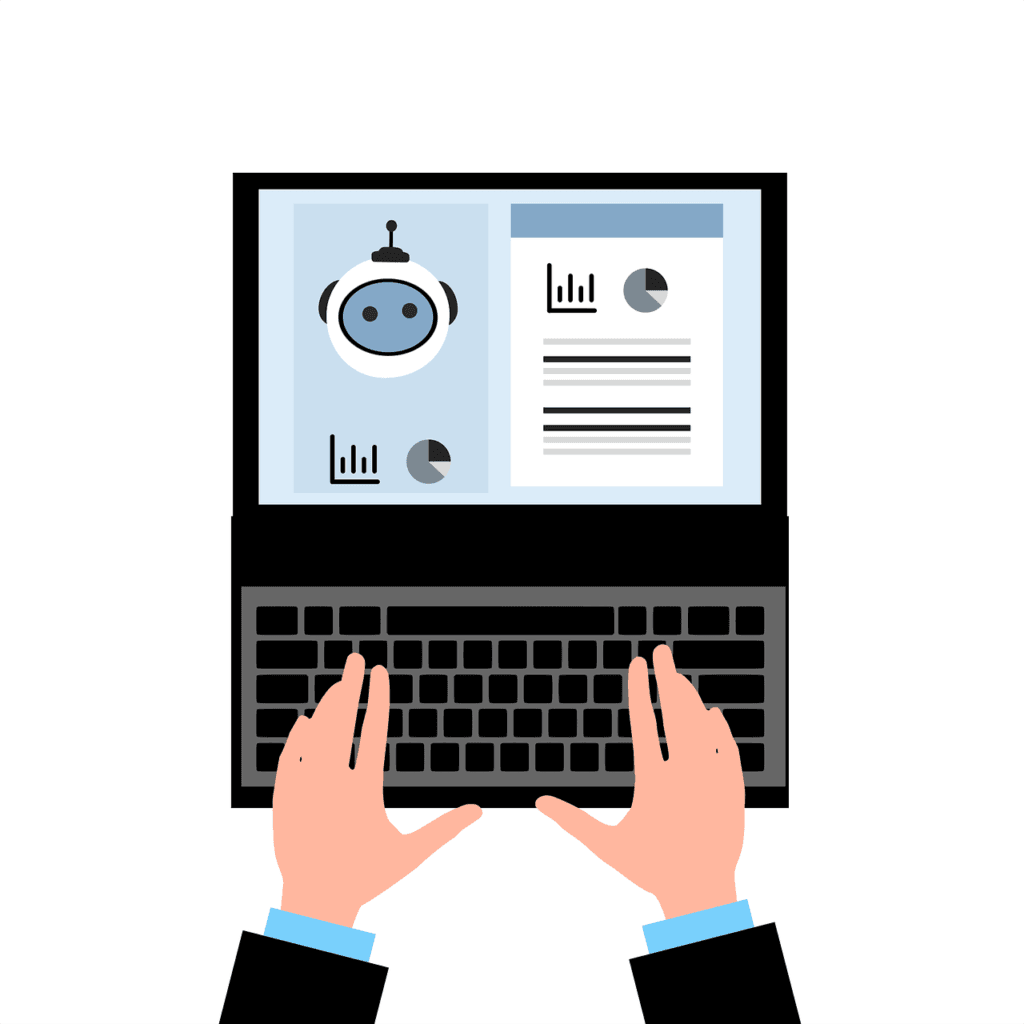Artificial Intelligence (AI) has changed the way businesses operate. With AI, companies can make better decisions faster. In business analytics, AI helps by analyzing huge amounts of data quickly, finding patterns, and giving insights that people might miss. This article will explore how AI can be used practically in business analytics to improve decision-making, customer service, and overall efficiency.
Understanding AI in Business Analytics
AI in business analytics means using smart computer systems to process and analyze data. These systems can learn from the data and improve their performance over time.
This helps businesses predict trends, understand customer behavior, and optimize operations.
Enhancing Decision-Making
One of the main uses of AI in business analytics is to improve decision-making. By analyzing data from various sources, AI can help managers make more informed decisions.
For example, AI can predict sales trends by analyzing past sales data, customer feedback, and market conditions. This helps businesses plan better and avoid costly mistakes.
Improving Customer Service
AI can also improve customer service by analyzing customer data and providing personalized recommendations. For instance, chatbots powered by AI can handle customer queries quickly and efficiently, providing instant support.
They can also analyze customer interactions to identify common issues and suggest improvements to the customer service process.
Optimizing Operations
AI can optimize business operations by analyzing data from different departments. For example, AI can analyze production data to identify bottlenecks and suggest ways to improve efficiency.
It can also analyze supply chain data to predict delays and recommend alternative routes.
Predictive Analytics
Predictive analytics is a powerful tool that uses AI to forecast future events based on historical data. This helps businesses anticipate changes and prepare for them in advance.
Sales Forecasting
AI can analyze past sales data and identify patterns that indicate future sales trends. This helps businesses forecast demand and adjust their inventory levels accordingly.
For example, a retail store can use AI to predict which products will be popular during a particular season and stock up accordingly.
Customer Behavior Prediction
AI can also predict customer behavior by analyzing data from various sources, such as social media, purchase history, and browsing patterns. This helps businesses understand what customers want and tailor their products and services to meet those needs.
For example, an online retailer can use AI to recommend products to customers based on their browsing history.
Risk Management
AI can help businesses manage risks by analyzing data and identifying potential threats. For example, AI can analyze financial data to identify patterns that indicate fraudulent activity.
This helps businesses take preventive measures and avoid losses.
Enhancing Marketing Strategies
AI can revolutionize marketing strategies by providing deeper insights into customer preferences and behavior. By analyzing data from various sources, AI can help businesses create more effective marketing campaigns.
Personalization
AI can personalize marketing messages by analyzing customer data and understanding their preferences. For example, an e-commerce site can use AI to recommend products to customers based on their previous purchases and browsing history.
This makes the marketing messages more relevant and increases the chances of conversion.
Customer Segmentation
AI can segment customers into different groups based on their behavior and preferences. This helps businesses target their marketing efforts more effectively.
For example, a travel company can use AI to identify customers who prefer luxury vacations and tailor its marketing messages to appeal to this segment.
Campaign Optimization
AI can optimize marketing campaigns by analyzing their performance and suggesting improvements. For example, AI can analyze data from social media campaigns to identify which messages are resonating with customers and which are not.
This helps businesses adjust their strategies in real-time and maximize their return on investment.
Enhancing Operational Efficiency
AI can significantly enhance operational efficiency by streamlining processes, reducing errors, and improving productivity. This can be achieved through several practical applications.
Automation of Routine Tasks
AI can automate routine tasks, freeing up employees to focus on more strategic activities. For instance, AI can handle data entry, scheduling, and even basic customer service interactions through chatbots.
This reduces the workload on employees and minimizes the risk of human error.
Supply Chain Optimization
In supply chain management, AI can analyze data to forecast demand, manage inventory levels, and optimize delivery routes.
For example, AI can predict which products are likely to run out of stock and suggest reordering them in advance. It can also analyze traffic patterns and weather conditions to recommend the fastest delivery routes.
Quality Control
AI can improve quality control in manufacturing by analyzing data from production lines.
For example, AI systems can detect defects in products by analyzing images from production lines. This helps businesses identify and address quality issues quickly, reducing waste and improving customer satisfaction.
Improving Financial Management
AI has numerous applications in financial management, from fraud detection to investment analysis. By analyzing large volumes of financial data, AI can provide valuable insights and improve financial decision-making.
Fraud Detection
AI can analyze transaction data to identify patterns that indicate fraudulent activity. For example, AI can detect unusual spending patterns or anomalies in transaction data that may indicate fraud.
This helps businesses take preventive measures and protect themselves from financial losses.
Investment Analysis
AI can analyze financial markets and provide insights into investment opportunities. For example, AI can analyze market trends, company performance, and economic indicators to recommend investment strategies.
This helps investors make more informed decisions and maximize their returns.
Financial Planning
AI can assist in financial planning by analyzing a business’s financial data and providing recommendations for budgeting and forecasting. For example, AI can analyze cash flow data to identify trends and suggest ways to improve financial stability.
This helps businesses plan for the future and make better financial decisions.
Enhancing Human Resources Management
AI can transform human resources management by improving recruitment, employee engagement, and performance management. By analyzing HR data, AI can help businesses make better decisions about their workforce.
Recruitment
AI can streamline the recruitment process by analyzing resumes and identifying the best candidates for a job.
For example, AI can analyze resumes to identify candidates with the skills and experience required for a position. This helps businesses find the best candidates quickly and efficiently.
Employee Engagement
AI can analyze employee data to identify factors that affect employee engagement and satisfaction. For example, AI can analyze survey data to identify common issues that affect employee morale.
This helps businesses take proactive measures to improve employee engagement and reduce turnover.
Performance Management
AI can improve performance management by analyzing employee performance data and providing insights into areas for improvement.
For example, AI can analyze sales data to identify top performers and suggest training programs for underperforming employees. This helps businesses improve overall performance and productivity.
Customer Insights and Engagement
AI can provide deeper insights into customer behavior and preferences, helping businesses improve customer engagement and satisfaction.
Customer Feedback Analysis
AI can analyze customer feedback from various sources, such as social media, reviews, and surveys. For example, AI can analyze social media posts to identify common themes and sentiments.
This helps businesses understand what customers like and dislike about their products and services.
Personalized Customer Experiences
AI can personalize customer experiences by analyzing customer data and providing tailored recommendations. For example, an online retailer can use AI to recommend products based on a customer’s browsing history and purchase behavior.
This makes the shopping experience more enjoyable and increases customer satisfaction.
Customer Retention
AI can help businesses improve customer retention by identifying factors that influence customer loyalty. For example, AI can analyze customer data to identify patterns that indicate a customer is likely to churn.
This helps businesses take proactive measures to retain customers and improve loyalty.
Enhancing Competitive Advantage
AI can give businesses a competitive edge by providing insights into market trends and competitor strategies. This helps businesses stay ahead of the competition and make better strategic decisions.
Market Trend Analysis
AI can analyze market data to identify trends and opportunities. For example, AI can analyze sales data, economic indicators, and social media trends to identify emerging markets and product opportunities.
This helps businesses stay ahead of the competition and capitalize on new opportunities.
Competitive Analysis
AI can analyze competitor data to identify strengths and weaknesses. For example, AI can analyze competitor pricing, marketing strategies, and customer reviews to provide insights into their performance.
This helps businesses understand their competitive landscape and develop strategies to outperform their competitors.
Strategic Decision-Making
AI can assist in strategic decision-making by providing insights into market conditions and business performance.
For example, AI can analyze financial data, market trends, and customer feedback to provide recommendations for business strategy. This helps businesses make better decisions and achieve their goals.
Enhancing Product Development

AI can significantly improve product development by providing insights into customer needs, optimizing design processes, and accelerating time-to-market.
Understanding Customer Needs
AI can analyze customer data to identify unmet needs and preferences. For example, AI can analyze customer feedback and social media posts to identify common requests for new features or improvements.
This helps businesses develop products that better meet customer expectations.
Optimizing Design Processes
AI can streamline the design process by analyzing data and suggesting improvements. For example, AI can analyze design prototypes to identify potential issues and recommend changes.
This reduces the time and cost of product development and improves the quality of the final product.
Accelerating Time-to-Market
AI can speed up the product development process by automating routine tasks and providing insights into potential bottlenecks. For example, AI can manage project timelines, track progress, and identify delays.
This helps businesses bring products to market faster and stay ahead of the competition.
Enhancing Supply Chain Management
AI can transform supply chain management by improving visibility, efficiency, and responsiveness. By analyzing supply chain data, AI can help businesses make better decisions and improve overall performance.
Improving Visibility
AI can provide real-time visibility into the supply chain by analyzing data from various sources, such as sensors, GPS, and inventory systems. For example, AI can track the location of shipments and monitor inventory levels.
This helps businesses identify potential issues and make informed decisions.
Enhancing Efficiency
AI can optimize supply chain operations by analyzing data and suggesting improvements.
For example, AI can analyze delivery routes to identify the most efficient paths and reduce transportation costs. It can also analyze inventory data to recommend optimal stock levels and reduce carrying costs.
Increasing Responsiveness
AI can improve supply chain responsiveness by predicting demand and identifying potential disruptions. For example, AI can analyze sales data to forecast demand and adjust production schedules accordingly.
It can also analyze weather data and geopolitical events to predict potential disruptions and recommend alternative routes.
Improving Customer Relationship Management (CRM)
AI can enhance CRM by providing deeper insights into customer behavior, improving customer interactions, and personalizing marketing efforts.
Deepening Customer Insights
AI can analyze CRM data to provide a deeper understanding of customer behavior and preferences.
For example, AI can analyze purchase history, browsing patterns, and social media interactions to identify trends and preferences. This helps businesses tailor their marketing efforts and improve customer satisfaction.
Enhancing Customer Interactions
AI can improve customer interactions by providing personalized recommendations and support.
For example, AI-powered chatbots can handle customer inquiries and provide instant support. They can also analyze customer interactions to identify common issues and suggest improvements to the customer service process.
Personalizing Marketing Efforts
AI can personalize marketing efforts by analyzing customer data and providing tailored recommendations. For example, AI can segment customers based on their behavior and preferences and deliver personalized marketing messages.
This improves the relevance of marketing efforts and increases the chances of conversion.
Enhancing Innovation and Creativity
AI can enhance innovation and creativity by providing new insights, automating routine tasks, and facilitating collaboration.
Providing New Insights
AI can provide new insights by analyzing data and identifying patterns that humans might miss. For example, AI can analyze market trends, customer feedback, and competitor strategies to identify new opportunities for innovation.
This helps businesses stay ahead of the competition and develop new products and services.
Automating Routine Tasks
AI can free up time for creative tasks by automating routine activities. For example, AI can handle data analysis, report generation, and administrative tasks.
This allows employees to focus on more creative and strategic activities.
Facilitating Collaboration
AI can facilitate collaboration by providing tools and platforms that enable teams to work together more effectively.
For example, AI-powered collaboration tools can analyze project data and provide insights into team performance. This helps teams work together more efficiently and achieve their goals.
Enhancing Security and Compliance

AI can enhance security and compliance by analyzing data, identifying potential threats, and ensuring adherence to regulations.
Identifying Potential Threats
AI can analyze security data to identify potential threats and vulnerabilities. For example, AI can analyze network traffic to detect unusual activity that may indicate a cyber attack.
This helps businesses take preventive measures and protect their assets.
Ensuring Compliance
AI can help businesses ensure compliance with regulations by analyzing data and identifying potential issues. For example, AI can analyze financial data to identify transactions that may violate regulations.
This helps businesses avoid fines and penalties and maintain their reputation.
Improving Incident Response
AI can improve incident response by analyzing data and providing recommendations for action. For example, AI can analyze security incidents to identify the root cause and recommend steps to prevent future occurrences.
This helps businesses respond to incidents more effectively and minimize damage.
Enhancing Employee Training and Development
AI can play a significant role in enhancing employee training and development by personalizing learning experiences, identifying skill gaps, and providing continuous feedback.
Personalized Learning Experiences
AI can analyze an employee’s learning style, performance, and preferences to tailor training programs specifically for them. For example, AI can recommend courses and materials that match an employee’s skill level and learning pace.
This ensures that employees receive the most relevant and effective training.
Identifying Skill Gaps
AI can analyze performance data to identify skill gaps in the workforce. For example, AI can evaluate an employee’s performance in various tasks and identify areas where they need improvement.
This helps businesses provide targeted training to address these gaps and enhance overall productivity.
Providing Continuous Feedback
AI can provide continuous feedback to employees by analyzing their performance and offering real-time insights. For example, AI can monitor an employee’s interactions with customers and provide feedback on their communication skills.
This helps employees improve continuously and develop their skills more effectively.
Enhancing Environmental Sustainability
AI can help businesses enhance their environmental sustainability by optimizing resource usage, reducing waste, and promoting green practices.
Optimizing Resource Usage
AI can analyze data to optimize the usage of resources such as energy and water. For example, AI can analyze energy consumption data to identify patterns and recommend ways to reduce usage.
This helps businesses minimize their environmental impact and reduce costs.
Reducing Waste
AI can help businesses reduce waste by analyzing production processes and identifying areas for improvement. For example, AI can analyze manufacturing data to identify inefficiencies and recommend ways to reduce material waste.
This not only helps the environment but also improves the bottom line.
Promoting Green Practices
AI can promote green practices by analyzing data and providing recommendations for sustainable practices. For example, AI can analyze supply chain data to identify suppliers with sustainable practices.
This helps businesses make more environmentally friendly choices and improve their sustainability.
Enhancing Innovation in Product Design
AI can revolutionize product design by providing insights into customer preferences, optimizing design processes, and enabling rapid prototyping.
Insights into Customer Preferences
AI can analyze customer data to provide insights into their preferences and needs. For example, AI can analyze social media posts and reviews to identify features that customers like or dislike in existing products.
This helps designers create products that better meet customer expectations.
Optimizing Design Processes
AI can streamline the design process by analyzing data and suggesting improvements. For example, AI can analyze design prototypes to identify potential issues and recommend changes.
This reduces the time and cost of product development and improves the quality of the final product.
Enabling Rapid Prototyping
AI can enable rapid prototyping by automating parts of the design process and providing real-time feedback. For example, AI can generate multiple design variations based on initial concepts and evaluate their performance.
This speeds up the prototyping process and helps businesses bring new products to market faster.
Enhancing Data-Driven Decision Making
AI can significantly enhance data-driven decision-making by providing deeper insights, automating data analysis, and enabling predictive analytics.
Deeper Insights
AI can analyze large volumes of data and provide deeper insights that humans might miss. For example, AI can analyze customer data to identify hidden patterns and trends.
This helps businesses make more informed decisions based on comprehensive insights.
Automating Data Analysis
AI can automate data analysis, making it faster and more accurate. For example, AI can process data from multiple sources in real-time and provide instant insights.
This reduces the time and effort required for data analysis and allows businesses to act quickly on the insights.
Enabling Predictive Analytics
AI can enable predictive analytics by analyzing historical data and forecasting future trends. For example, AI can analyze sales data to predict future demand and help businesses plan their inventory accordingly.
This helps businesses stay ahead of market trends and make proactive decisions.
Enhancing Marketing Analytics

AI can revolutionize marketing analytics by providing deeper insights into customer behavior, optimizing marketing campaigns, and improving return on investment.
Deeper Insights into Customer Behavior
AI can analyze customer data to provide deeper insights into their behavior and preferences. For example, AI can analyze social media interactions to identify trends and sentiments. This helps businesses understand their customers better and tailor their marketing efforts accordingly.
Optimizing Marketing Campaigns
AI can optimize marketing campaigns by analyzing their performance and suggesting improvements. For example, AI can analyze data from digital advertising campaigns to identify which ads are performing well and which are not.
This helps businesses adjust their strategies in real-time and maximize their return on investment.
Improving Return on Investment
AI can improve the return on investment (ROI) of marketing campaigns by providing more accurate targeting and personalization.
For example, AI can analyze customer data to identify the most effective channels and messages for reaching different segments of the audience. This ensures that marketing efforts are more relevant and effective, leading to higher ROI.
Wrapping it up
AI’s practical applications in business analytics are transforming how companies operate, making processes more efficient, decisions more informed, and customer experiences more personalized. From improving decision-making and customer service to optimizing supply chains and enhancing product development, AI provides invaluable insights and efficiencies.
Embracing AI is essential for businesses aiming to stay competitive and thrive in today’s fast-paced, data-driven environment. By leveraging AI, companies can unlock new opportunities, drive innovation, and achieve greater success.
READ NEXT:
- How to Market Your Hair Styling Business
- Creative Text Marketing Campaign Ideas
- Effective Marketing Strategies for Lash Technicians
- How to Market Your Pressure Washing Business
- Marketing Strategies for Financial Services






















Comments are closed.